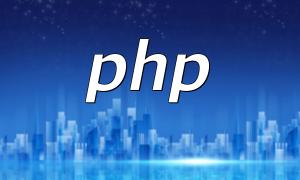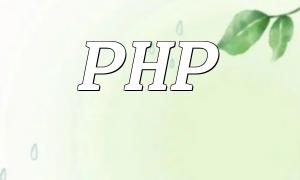In PHP programming, the use of delimiters is crucial as they help organize code structure, ensure logical clarity, and guarantee correct execution. This article delves into common PHP server script delimiters, specifically braces, semicolons, colons, and parentheses, offering practical code examples to provide developers with useful insights.
Braces in PHP are primarily used to define code blocks, functions, and classes, serving as boundary markers for logical units. By using braces, PHP developers can clearly organize conditional statements, loops, and class definitions. Below is a basic example:
if ($condition) { // code block}In this code snippet, the braces enclose the execution block for the condition, ensuring that the code is treated as a cohesive unit.
The semicolon is one of the most common delimiters in PHP syntax. It marks the end of a statement. Whether it's a simple assignment or a complex function call, each statement must end with a semicolon. Here's a simple example:
$a = 1;$b = 2;$c = $a + $b;In these lines of code, the semicolon marks the end of each statement, allowing the PHP engine to identify the boundaries of each command.
The colon is commonly used in PHP to denote the start of control flow statements (such as if, else, for, and foreach) and some loop constructs. Its role is to mark the beginning of a block of code, with subsequent lines needing to be indented. Here's an example:
if ($condition): echo "Condition is true";else: echo "Condition is false";endif;The above code uses the colon to indicate the start of the if and else blocks, and indentation is used to structure the statements inside those blocks. The block's end is marked by the `endif;` keyword.
Parentheses are commonly used in PHP for function calls and parameter passing. They ensure that functions receive the necessary parameters and execute the logic accordingly. Here's a typical example:
function multiply($a, $b) { return $a * $b;}$result = multiply(3, 4);In this example, parentheses are used to pass parameters to the `multiply` function, and the return value is assigned to the `$result` variable.
Parentheses can also be used to change the order of operations, as shown below:
$result = (1 + 2) * 3;In this case, the parentheses change the precedence of the addition and multiplication operations.
Through the analysis above, it's clear that PHP delimiters—braces, semicolons, colons, and parentheses—play important roles in organizing and controlling the flow of code execution. Using these delimiters properly not only improves code readability but also reduces the likelihood of syntax errors. Mastering these essential PHP syntax techniques will help developers write cleaner, more maintainable code.








